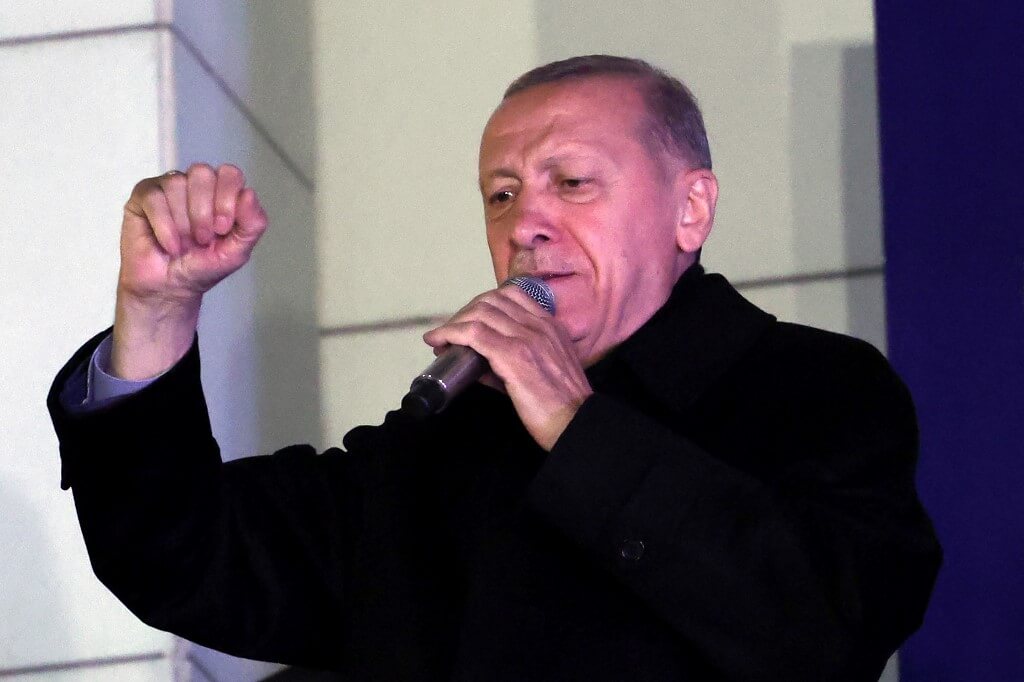The unofficial results of the parliamentary election on Sunday show that President Recep Tayyip Erdoğan’s Public Alliance gained the majority in the 600-seat parliament with 321 lawmakers in total, the Gazete Duvar news website reported on Monday.
The Public Alliance is formed by Erdoğan’s ruling Justice and Development Party (AKP), its far-right ally the Nationalist Movement Party (MHP), the Islamist New Welfare Party (YRP) and the nationalist Grand Unity Party (BBP).
According state-run Anadolu news agency data, based on the results in over 99 percent of the ballot boxes across Turkey, the Public Alliance received 49.37 percent of the vote, with the AKP garnering 35.49 percent, the MHP 10 percent, the YRP 2.83 percent and the BBP 0.99 percent.
While the ruling AKP won seats for 266 lawmakers, a decrease from 295 in the last parliamentary election in 2018, the MHP and YRP obtained 50 and five seats, respectively. The BBP failed to secure any representation in parliament.
The opposition’s Nation Alliance, a bloc of six political parties that nominated candidates from the Republican People’s Party (CHP) and its nationalist ally the İYİ (Good) Party, was able to secure 213 seats in parliament in total, with 169 (25.38 percent) of them belonging to the main opposition CHP and 44 (9.75 percent) to İYİ.
The parliamentary candidates of the Felicity Party (SP), the Democracy and Progressive Party (DEVA), the Future Party (GP) and the Democrat Party (DP) within the alliance were included in the CHP lists.
The remaining seats were won by the Green Left Party (YSP) with 62 lawmakers, under whose banner the pro-Kurdish Peoples’ Democratic Party (HDP) ran, and the Workers’ Party of Turkey (TİP), with four lawmakers. The YSP gained 8.8 percent of the vote, while TİP garnered 1.73 percent, according to Anadolu.
In a bid to circumvent the risks that could emerge from its possible closure ahead of the elections, HDP ran in the elections under the banner of the YSP.
The HDP is facing a closure case on terrorism charges that was filed in March 2021 and could have been concluded before the elections since the Constitutional Court, which is hearing the case, rejected the HDP’s request to delay the verdict until after the elections.
The results of the May 14 parliamentary election, which is considered to be the biggest challenge of President Erdoğan in his 21 years of rule with the AKP, did not turn out as expected since many recent surveys showed the AKP’s vote slightly above 30 percent and the MHP’s vote at around 6 to 7 percent, while the Nation Alliance’s vote was over 40 percent.
In April 2022, Turkey reduced its election threshold from 10 to 7 percent in a move that many said was aimed at saving the MHP from remaining below the election threshold.
It seems the Nation Alliance, which pledged to introduce a “strengthened parliamentary system,” failed to secure 360 seats needed to bring about a referendum on ending the current executive presidency.
Through a referendum in April 2017, Turkey switched from a parliamentary system of governance to an executive presidential system that granted Erdoğan and his ruling AKP sweeping powers and was criticized for removing constitutional checks and balances, thus leading to a further weakening of Turkish democracy. Critics call the system “one-man rule.”

